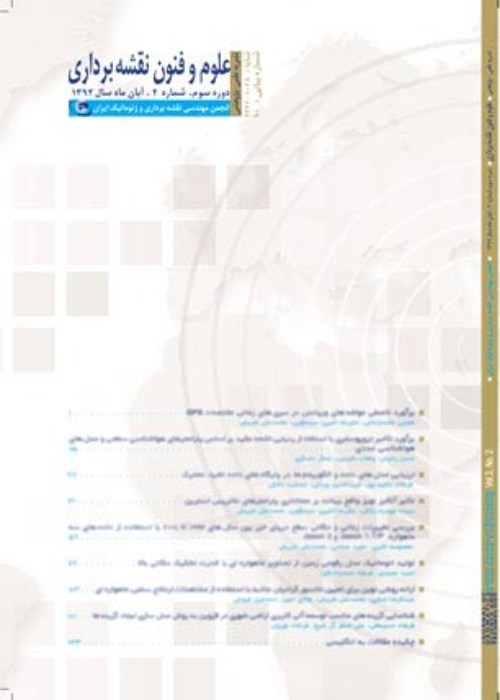Presenting Spatial Strategies for Agent-Based Task Allocation in Disaster Environments
Author(s):
Article Type:
Research/Original Article (دارای رتبه معتبر)
Abstract:
Proper task allocation among agents enhances a system’s performance and reduces the probability of disorder in resolving a wide range of issues. Appropriate allocations are critical for the efficient implementation of tasks undertaken in natural hazard environments. Task allocation plays an important role in coordinating a multi-agent system (MAS) among a set of agents. Multi-agent systems consist of several automatic and autonomous agents that coordinate their activities to achieve a goal. Agents fail to reach their ultimate goal without the proper assignment of tasks. A proper approach to task allocations plays an important role in decision-making, particularly in urban search and rescue (USAR) operations in crisis-ridden areas. In the last decade, several studies were conducted regarding task allocation and different approaches have been presented to consider assigning tasks in MASs.
This paper intends to provide an approach to task allocation in disaster environments through the consideration of appropriate spatial strategies to deal with disturbances. The challenge of this study is to provide the possibility of task reallocation in order to deal with uncertainties and events during the implementation.The main innovation of the study is that it presents an approach to improve conditions during reallocations, or future allocations, when initial allocations face problems due either to available uncertainties, or the addition of a new task. In other words, based on the nature of the implementation environment (natural disaster environments), current allocation is not only considered but it is performed with regard to future allocations. The selected spatial strategies for a change the order of tasks (preparation for reallocation) are different in accordance with the conditions and the studied phenomenon. In general, strategies are selected in such a way that the final cost of the system will not increase abnormally if initial allocations face a problem. For example, building destruction level are uniformly distributed after an earthquake. Therefore, the convergence of rescue groups should be prevented as much as possible and the initial allocation should be done in such way to decrease agent movement in future allocations.
The proposed method is presented in five phases: ordering existing tasks, finding coordinating agent, holding an auction, applying allocation strategies and implementation and observation of environmental uncertainties. The scalability of the proposed method was evaluated with the contract net protocol (CNP) method. In comparison with CNP, the standard time of rescue operations in the proposed approach includes at least 12% of improvement and the maximum improvement of 30% and the average percentage of recovery was 19%. Then obtained from the simulation of the proposed approach indicated that the time of rescue operations in the proposed scenarios was always less than the time required in the CNP method.
Further, the evaluations based on deceased people and incorrect allocations indicated the feasibility of the proposed approach. The comparison of the proposed strategies at different levels of uncertainty showed that an increase in uncertainty leads to an increased rescue time for CNP. An effective assigning approach should consider strategies for replanning in order to waste the least time during system disruptions. This optimizes planning to achieve better implementation time and provides conditions for fault tolerance. Also, considering strategies in the task allocation process, especially spatial strategies, resulted in the optimization and increased flexibility of the allocation as well as conditions for fault tolerance and agent-based cooperation stability in emergency management.
Keywords:
Language:
Persian
Published:
Journal of Geomatics Science and Technology, Volume:8 Issue: 2, 2018
Pages:
173 to 188
magiran.com/p1930575
دانلود و مطالعه متن این مقاله با یکی از روشهای زیر امکان پذیر است:
اشتراک شخصی
با عضویت و پرداخت آنلاین حق اشتراک یکساله به مبلغ 1,390,000ريال میتوانید 70 عنوان مطلب دانلود کنید!
اشتراک سازمانی
به کتابخانه دانشگاه یا محل کار خود پیشنهاد کنید تا اشتراک سازمانی این پایگاه را برای دسترسی نامحدود همه کاربران به متن مطالب تهیه نمایند!
توجه!
- حق عضویت دریافتی صرف حمایت از نشریات عضو و نگهداری، تکمیل و توسعه مگیران میشود.
- پرداخت حق اشتراک و دانلود مقالات اجازه بازنشر آن در سایر رسانههای چاپی و دیجیتال را به کاربر نمیدهد.
In order to view content subscription is required
Personal subscription
Subscribe magiran.com for 70 € euros via PayPal and download 70 articles during a year.
Organization subscription
Please contact us to subscribe your university or library for unlimited access!




